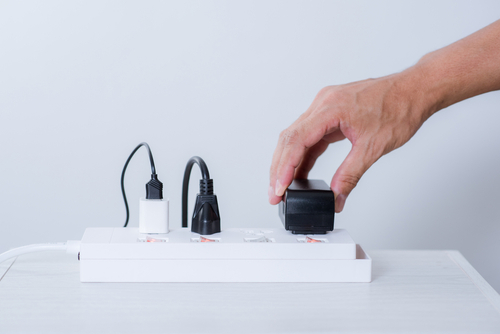Protect Against A Power Surge In Your Home
Written By: Warm Thoughts Communications on November 23, 2020 
5 Ways To Avoid Inconvenient Loss Of Power
Power surges can be a costly reminder about how fragile our electronics and appliances can be: Just a split second of high voltage can fry expensive computers, TVs, stereo equipment, your security system and more.
But what exactly is a power surge, and how do you avoid one? Let’s take a look.
Power surges 101
A power surge is caused by a temporary increase of voltage above the normal 120 volts (in most cases) sent through your home’s power lines. (Some lines in your home can be run at higher voltages to accommodate heavy duty appliances, such as electric stoves and clothes dryers.) While home power lines are built to withstand peak voltages exceeding 120 volts, they are not capable of handling the massive overload of electricity that can happen through your lines during a power outage.
So, what causes this massive electrical overload? Here are four likely culprits:
- Severe weather: Lightning strikes can be particularly dangerous, causing surges that can exceed one million volts! The good news is that they don’t happen often. A more likely weather-related cause of a power surge is downed power lines, generally caused by high winds.
- Poor wiring: Damaged or badly installed wiring is another common source of a power surge. If your lights flicker when your refrigerator clicks on or you hear buzzing in your wiring, you may be at risk for power surges—or even an electrical fire.
- Home appliances: Heavy duty home appliances such as your refrigerator or A/C compressor can disrupt the normal flow of electricity in your home.
- Local rises in energy demand: Most of us have probably experienced a power outage on a hot summer day when everyone’s air conditioners are running; when that power comes back on, it often surges.
Tips For Protecting Your Home And Appliances From A Power Surge
Knowing what causes a power surge is good information to have, but that knowledge alone won’t protect your equipment! While some power surges are impossible to prevent, you can protect your family—and your expensive belongings—from much of the damage they cause by following these simple suggestions.
- Use quality surge protectors. Always plug expensive computers, televisions and appliances into a surge protector. While a surge protector won’t do much against mega surges, it will prevent damage from far more common lower-voltage surges.
- Consider installing a whole-house surge protection system. A heavy-duty, whole-house surge protection system will direct excess voltage—even massive bursts from lightning—into the ground where they dissipate and cause no harm. If you have a lot of expensive electronics, such as a full-home studio or office setup in your residence, a system like this could be worth the investment.
- Unplug expensive electronics and appliances during severe weather. When an electrical storm is imminent, unplug televisions, computers and other sensitive devices. Don’t just shut them off—unplug them from the wall!
- Schedule an electrical audit. Faulty wiring is common in older homes where cloth-wrapped wires, fraying, rodent damage and underrated cabling abound. If you own an older home, strongly consider having a qualified electrician take a look at your wiring. This could help you avoid incurring inspection fines, and it could even save your house from an electrical fire.
- Be smart about your appliances. Plugging too many power-hungry devices into the same outlet could overload your electrical system—don’t do it!
The Bottom Line
Most homes will experience a power surge at some point; the good news is that most of these incidents will cause only minimal damage. Still, it pays to prepare—and to avoid putting your home and your most expensive appliances and devices in harm’s way!
With a little awareness and preparation, you can minimize the cost and inconvenience of appliance repairs and electronic replacement, extending the life of all your equipment in the process.
When it comes to electricity in your home, safety always comes first! What comes second? Getting that electricity at the best price possible—something we here at Discount Power can help you with! Contact us today to learn more about smart, economical electricity plans in MA, CT, RI, NJ, MD, PA and OH to learn how easy it is to make the switch!
